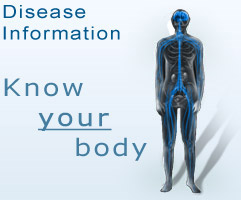Schizophrenia
What is schizophrenia?
Schizophrenia is a chronic, disabling brain disorder. It affects the human personality, and the person's logical thinking, feelings and expression, perception and relating to others, become separated from one another. The person finds it difficult to tell the difference between the real and the imagined, to think logically, to express feelings, or to behave appropriately. People with schizophrenia often have difficulty functioning in society, at work and in school. The condition can be difficult to live with, not only for the individuals who are affected but for their families as well.
Frequency
Schizophrenia affects approximately 1% of the world's population and is found in all ethnic and social groups. It rarely affects children.
It can be difficult to diagnose schizophrenia in teens because the first signs may include a change of friends, a drop in grades, sleep problems and irritability; behaviours that are common among teens. A combination of factors can predict schizophrenia in up to 80% of youth who are at high risk of developing the condition.
Schizophrenia cannot be cured, but the symptoms can be reduced significantly with treatment. The vast majority of people with schizophrenia are living either full and productive lives or relatively independent lives.
Symptoms
The symptoms of schizophrenia fall into three broad categories: positive symptoms, negative symptoms and cognitive symptoms.
- Positive symptoms are psychotic behaviours present in people with schizophrenia that healthy individuals do not experience. Those with positive symptoms lose touch with reality. These symptoms may come and go, are sometimes severe and at other times are hardly noticeable depending on whether the individual is receiving treatment. The symptoms include:
- Hallucinations - things a person sees, hears, smells or feels that no one else can see, hear, smell or feel.
- Delusions - false beliefs that are not part of the person's culture and do not change.
- Thought disorders - unusual ways of thinking.
- Movement disorders - may appear as abnormal or agitated body movements.
- Negative symptoms relate to disruption of normal emotions and behaviours. These symptoms are harder to recognise and can be mistaken for depression or other conditions. They include:
- ‘flat affect' (a person's face does not move or he or she talks in a dull or monotonous voice)
- lack of ability to experience pleasure in everyday life
- lack of ability to begin and sustain planned activities
- speaking little, even when forced to interact.
People with negative symptoms need help with everyday tasks. They often neglect basic personal hygiene.
- Cognitive (intelligence) symptoms are subtle and may be difficult to recognise. They are often detected only when other tests are performed. Cognitive symptoms include:
- poor ability to understand information and use it to make decisions
- trouble focusing or paying attention
- problems with the ability to use information immediately after learning it.
Cognitive symptoms often make it hard to lead a normal life and earn a living. They can cause great emotional distress.
Causes of schizophrenia
It is believed that several genes are associated with an increased risk of schizophrenia. Recent studies suggest that schizophrenia may result in part when a certain gene, that is key to making important brain chemicals, malfunctions.
Treatment
Treatment helps relieve many symptoms of schizophrenia, but most people who have the disorder cope with symptoms throughout their lives. However, many people with schizophrenia can lead rewarding and meaningful lives in their communities.
To read more, click here.
 TransmedBanner4.jpg)

